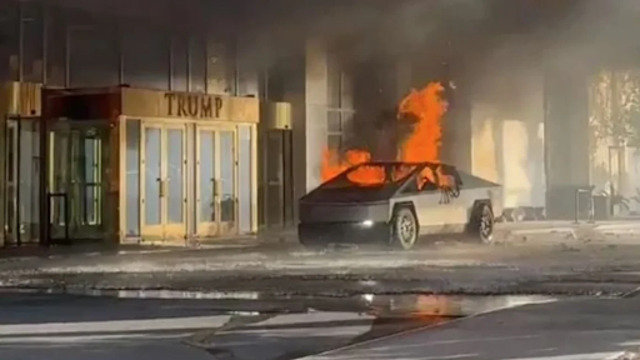
A Tesla Cybertruck exploded outside the Trump International Hotel in Las Vegas last week. CNN
A tragic and bizarre incident occurred in Las Vegas when an active-duty US Army Green Beret, Matthew Livelsberger, exploded a Tesla Cybertruck outside the Trump International Hotel, using artificial intelligence (AI) to help plan the attack. Authorities have revealed that Livelsberger, who was on leave from his base in Germany, used ChatGPT to gather information on explosives, firearms, and how to make anonymous purchases in the days leading up to the explosion.
Sheriff Kevin McMahill described the use of AI as a “game changer” during a news conference on January 7, 2025. He emphasized the growing concern over how AI tools could be misused for harmful purposes, noting that this incident marks a first in the United States where ChatGPT was employed to help build an explosive device. “We knew that AI was going to change the game at some point or another,” McMahill said, “but this is certainly a concerning moment for us.”
The Las Vegas explosion, which occurred on January 1, 2025, resulted in Livelsberger fatally shooting himself before the blast, leaving seven people injured. Investigators revealed that the explosion was caused by a car bomb, involving fireworks, gas tanks, and camping fuel placed in the truck's bed, all detonated by a device Livelsberger controlled.
The incident raised numerous questions about Livelsberger's motivations. Authorities found a six-page manifesto on his phone, which, along with two previously released letters, discussed his "political grievances," conflicts from his military service, and struggles with personal issues. In his manifesto, Livelsberger described vivid and graphic memories from his military experience, which seemed to haunt him. He admitted feeling like a "shell of a human being" with "nothing to live for." The soldier stated that he wanted the explosion to be as public as possible, adding that he was "loaded up on boom and quotations" for the New Year's event. Despite the scale of the bomb, he mentioned in his writings that he “didn’t intend to hurt anybody else.”
The FBI, ATF, and local law enforcement are continuing their investigation into the explosion. Kenny Cooper, Assistant Special Agent in Charge with the ATF, revealed that at least 60 pounds of explosive material was found in the truck. If the device had detonated as intended, the blast could have been far more devastating. However, it’s unclear whether Livelsberger had intended to commit a suicide attack or if he was trying to cause a much larger explosion.
During the investigation, authorities also found spent 50-caliber cartridge casings at the scene, which were consistent with the explosion. The sheriff’s department emphasized that they are exploring all possibilities, including the potential for terrorism, but have not ruled out other factors such as PTSD and mental health struggles.
The use of AI in planning attacks like this has raised alarms for law enforcement across the country. While OpenAI, the developer of ChatGPT, has expressed sorrow over the incident, they stressed that the tool is designed to refuse harmful instructions. However, the response from the AI was based on publicly available information, raising questions about the potential dangers of AI being used in malicious ways.
In conclusion, the tragic event in Las Vegas has highlighted the growing risks associated with AI technology. As investigations continue, the focus remains on understanding the role AI played in this attack and the challenges it poses for future law enforcement efforts.















